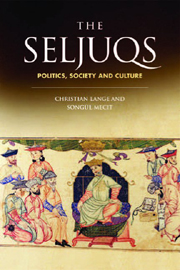Book contents
- Frontmatter
- Contents
- List of figures
- Acknowledgements
- List of abbreviations
- INTRODUCTION
- PART I POLITICS
- PART II SOCIETY
- Part III CULTURE
- 11 SHIˁI JURISPRUDENCE DURING THE SELJUQ PERIOD: REBELLION AND PUBLIC ORDER IN AN ILLEGITIMATE STATE
- 12 IN DEFENCE OF SUNNISM: AL-GHAZĀLĪ AND THE SELJUQS
- 13 ARABIC AND PERSIAN INTERTEXTUALITY IN THE SELJUQ PERIOD: ḤAMĪDĪ'S MAQĀMĀT AS A CASE STUDY
- 14 CITY BUILDING IN SELJUQ RUM
- 15 THE SELJUQ MONUMENTS OF TURKMENISTAN
- Index
12 - IN DEFENCE OF SUNNISM: AL-GHAZĀLĪ AND THE SELJUQS
from Part III - CULTURE
Published online by Cambridge University Press: 12 September 2012
- Frontmatter
- Contents
- List of figures
- Acknowledgements
- List of abbreviations
- INTRODUCTION
- PART I POLITICS
- PART II SOCIETY
- Part III CULTURE
- 11 SHIˁI JURISPRUDENCE DURING THE SELJUQ PERIOD: REBELLION AND PUBLIC ORDER IN AN ILLEGITIMATE STATE
- 12 IN DEFENCE OF SUNNISM: AL-GHAZĀLĪ AND THE SELJUQS
- 13 ARABIC AND PERSIAN INTERTEXTUALITY IN THE SELJUQ PERIOD: ḤAMĪDĪ'S MAQĀMĀT AS A CASE STUDY
- 14 CITY BUILDING IN SELJUQ RUM
- 15 THE SELJUQ MONUMENTS OF TURKMENISTAN
- Index
Summary
In this chapter I shall attempt to place al-Ghazālī's political thought in the context of the Seljuq sultanate and the late Abbasid caliphate, starting from two premises: firstly, that al-Ghazālī's political thought is as significant as his mystical or theological thought; and secondly, that it is understandable only in the light of the political developments of his time.
I should like to begin to formulate an answer to the question raised in the title of the conference whose proceedings are collected in this volume: did the Seljuqs revitalise Islam? Probably they did or at least they brought a measure of order to a Muslim world in turmoil, but in so doing they sacrificed the prestige and the very role of the caliphate. There has been a wide debate about whether the Seljuqs were the defenders or the enemies of the caliphate. In a sense, they defended the caliphate insofar as they allowed it to endure a few centuries longer. But from another point of view, they were enemies of the caliphate in that they imposed a secular image of power against the religious legitimisation of the caliphal power. In other words, while, on the one hand, the Seljuqs protected the institution of the caliphate against its many adversaries, like the Ismaʿilis, on the other hand they made it evident that the management of power in Islam was no longer a question of the Islamic state but rather of an Islamic model of the state. Let us examine these contentions more closely.
- Type
- Chapter
- Information
- The SeljuqsPolitics, Society and Culture, pp. 228 - 239Publisher: Edinburgh University PressPrint publication year: 2011

